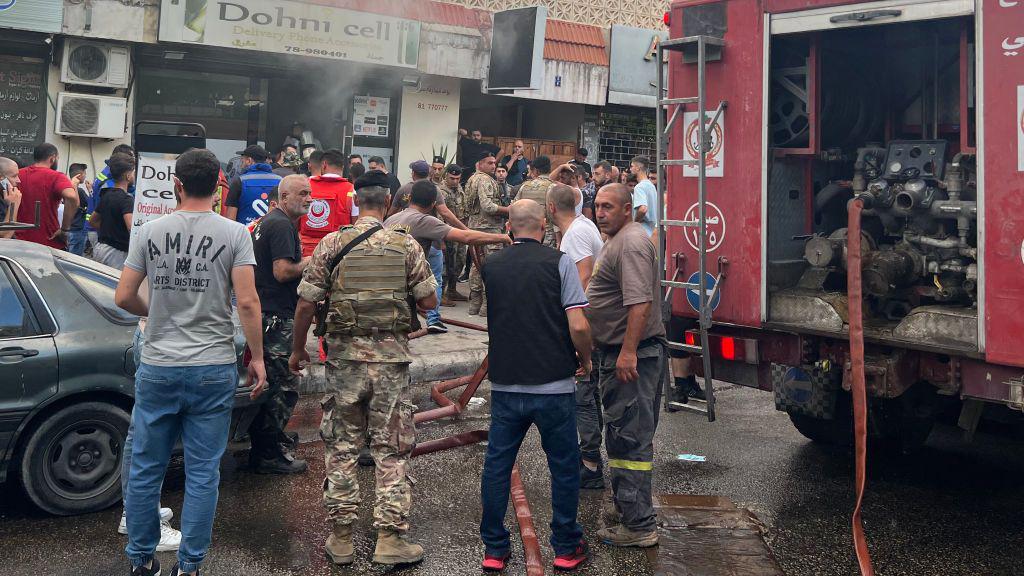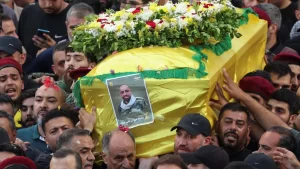Deadly Explosions in Lebanon Claim 20 Lives, Injure Hundreds
3 min read
Explosions were reported in southern Lebanon, including the city of Sidon, as well as Beirut's southern suburbs and the Bekaa Valley.

Explosions were reported in southern Lebanon, including the city of Sidon, as well as Beirut's southern suburbs and the Bekaa Valley.
At least 20 people have died and over 450 have been injured following a series of explosions linked to wireless communication devices in Lebanon, according to the country’s health ministry. The blasts occurred in southern Beirut, the Bekaa Valley, and southern Lebanon—regions regarded as strongholds of the armed group Hezbollah.
These explosions followed a previous incident in which 12 people were killed when Hezbollah members’ pagers detonated on Tuesday. Hezbollah attributed the attacks to Israel, which has yet to respond to these allegations. The situation escalates amid growing tensions, as Israel’s Defence Minister Yoav Gallant declared a “new phase in the war,” coinciding with the redeployment of an Israeli army division to the north.
UN Secretary General António Guterres has expressed concern over the potential for a dramatic escalation in violence, urging all parties to exercise maximum restraint. He noted that the logic behind the recent explosions may indicate a preemptive strike ahead of a significant military operation. This unrest comes after 11 months of intermittent cross-border clashes ignited by the ongoing conflict between Israel and Hamas in Gaza.
Shortly after the latest explosions, Israeli Prime Minister Benjamin Netanyahu emphasized his commitment to safely resettle the tens of thousands displaced from northern Israel. Defence Minister Gallant also reiterated that Israel is entering a new phase of conflict, with military resources and personnel now being diverted to the northern front.
Hezbollah has stated that its actions are in support of Hamas, which is also backed by Iran and classified as a terrorist organization by Israel and many Western nations. The group has asserted that it will continue its cross-border attacks until the situation in Gaza stabilizes.
Speculation regarding Hezbollah’s next moves may be clarified during a speech scheduled for Thursday by its leader, Hassan Nasrallah. The deadly explosions on Wednesday represent a significant setback for Hezbollah, suggesting that its communications network may have been compromised.
The Lebanese populace is reeling from the explosions that occurred during public gatherings, including funerals. On Tuesday, a wave of simultaneous pager explosions left 12 people dead, including two children aged eight and eleven. The health minister reported that approximately 2,800 individuals were injured.

Reports from the scene indicate that chaos erupted during a funeral in Dahiya, a southern Beirut suburb, when another explosion was heard around 17:00 local time. Eyewitness accounts describe confusion among mourners as news of further explosions spread across the country.
The Lebanese Red Cross mobilized over 30 ambulances to respond to incidents in Beirut and surrounding areas. The health ministry stated that the explosions specifically targeted walkie-talkies, devices associated with Hezbollah. An insider source confirmed to AFP that these walkie-talkies detonated during the events.
Lebanon’s state-run National News Agency reported that one fatality occurred in a shop selling cellular devices in Chaat when a walkie-talkie exploded. The device, identified as an ICOM-V82, is a handheld radio model that has since been discontinued. Additional explosions were reported in Baalbek, where video footage showed damage to a residence.
Security sources indicated that Hezbollah had purchased these walkie-talkies approximately five months prior to the explosions, coinciding with the acquisition of the problematic pagers. Reports from Axios suggested that Israeli intelligence had potentially rigged these communication devices with explosives before their delivery to Hezbollah.
In the wake of the explosions, medical professionals have reported devastating injuries among the victims. An ophthalmologist from a Beirut hospital stated that around 60% of those treated had suffered severe eye injuries, with many losing limbs as well. Dr. Elias Warrak described the day as one of the most traumatic of his career, noting that the scope of the injuries was catastrophic and extended beyond ocular damage to include significant facial and brain trauma.
As the situation unfolds, the international community watches closely, wary of an escalating conflict that could further destabilize the region.
WhatsApp us